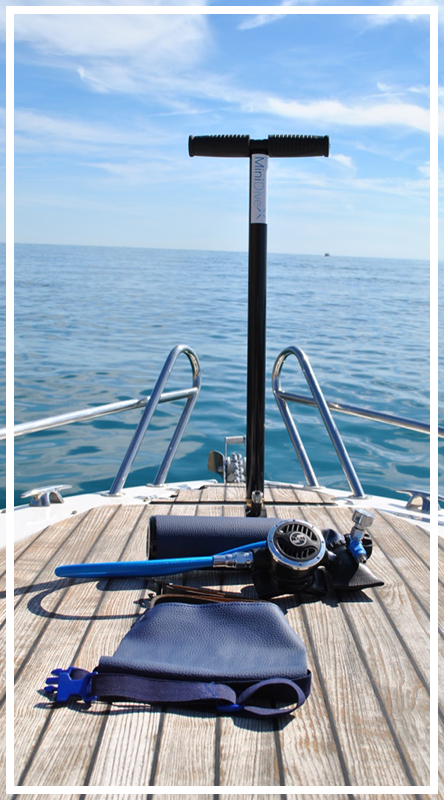
Where to Dive with a Mini Scuba Tank in Freshwater? Best Spots, Tips & Safety
Where to Dive with a Mini Scuba Tank in Freshwater? Best Spots, Tips & Safety

Diving with a mini scuba tank is a fun and accessible way to explore the underwater world without bulky equipment or advanced certifications. Lakes, rivers, and quarries in France and Germany offer perfect conditions for beginners and casual divers. However, even in freshwater, safety must remain your top priority.
Why Choose a Mini Scuba Tank for Freshwater Adventures?
MiniDive tanks allow users to breathe underwater for 5 to 15 minutes depending on the model. They're ideal for:
- Short dives in shallow water
- Snorkeling with assisted breathing
- Underwater photography and exploration
- Boat maintenance and mooring inspections
Their portability, ease of use, and reliability make mini scuba tanks perfect for families, beginners, and outdoor enthusiasts.
Top Freshwater Diving Locations in Germany
Germany has many ideal freshwater diving locations, including:
- Kreidesee Hemmoor: Crystal-clear water, ideal for visibility and entry-level dives.
- Baggersee Karlsruhe: Calm, controlled environment – perfect for training.
- Walchensee (Bavaria): Alpine scenery with pristine water; cold but rewarding.
- Schladitzer See (Saxony): Family-friendly recreational lake with designated dive zones.
Always check local regulations before diving. Some lakes require permits or restrict equipment types.
Best Freshwater Dive Spots in France
- Lac d’Annecy: Clear, shallow, and perfect for beginners and families.
- Lac du Bourget: France’s largest natural lake, calm and scenic.
- Carrière de Roussay: Popular quarry for safe recreational diving.
- Étangs d’Apigné (Rennes): Accessible city-side location, ideal for a quick dive.
Main Risks – and How to Avoid Them
Even though mini scuba tanks are user-friendly, diving still comes with risks. Here are the most common, along with simple prevention tips:
1. Running Out of Air
Mini tanks contain limited air volume. Solution: Monitor your dive time closely, and surface before the tank runs low.
2. Cold Shock or Hypothermia
Freshwater can be cold even in summer. Solution: Wear a shorty or full wetsuit based on temperature.
3. Panic Underwater
Unfamiliar environments can cause anxiety. Solution: Practice in shallow areas and dive only with supervision.
4. Poor Visibility and Orientation Loss
Murky water can reduce visibility. Solution: Stay close to shore and use a surface marker buoy.
5. Improper Pressure Equalization
Even shallow dives require equalization. Solution: Pinch your nose and exhale gently while descending.
Recommended MiniDive Gear for Freshwater Use
Here’s the best MiniDive equipment for lakes and rivers:
- MiniDive Carbon+ (1.1 L): Maximum autonomy, ideal for long exploration dives.
- MiniDive Pro+ (0.85 L): Perfect for short recreational use with a lightweight profile.
- MiniDive Dual Pack (2×0.5 L): Share with a buddy or extend your dive time.
- MiniDive Air Hand Pump: Allows you to refill anywhere, anytime.
Safety Tips for First-Time Users
- Never dive alone – always go with a buddy
- Stay within 3–5 meters depth
- Breathe slowly and stay calm underwater
- Use a well-fitted harness and adjust it properly
- Only dive in approved or safe locations
Getting Started with Mini Scuba
If you're new to diving, start small. Practice in pools or designated shallow zones. For more guidance:
- Watch helpful videos on our MiniDive YouTube Channel
- Explore tips and guides on our MiniDive Blog
- Test your tank in 3–5 minute sessions before deeper or longer dives
Final Thoughts
Freshwater diving with a MiniDive tank is a fun, safe, and simple way to enjoy underwater adventures in Europe’s most beautiful lakes. Whether you’re exploring alpine waters in Germany or scenic French quarries, the right gear and preparation make all the difference.
SEO keywords included: mini scuba tank, freshwater diving, beginner scuba gear, MiniDive equipment, safe lake diving, shallow water scuba, portable dive tank, diving in Germany, scuba for beginners, snorkeling with air support.

All comments